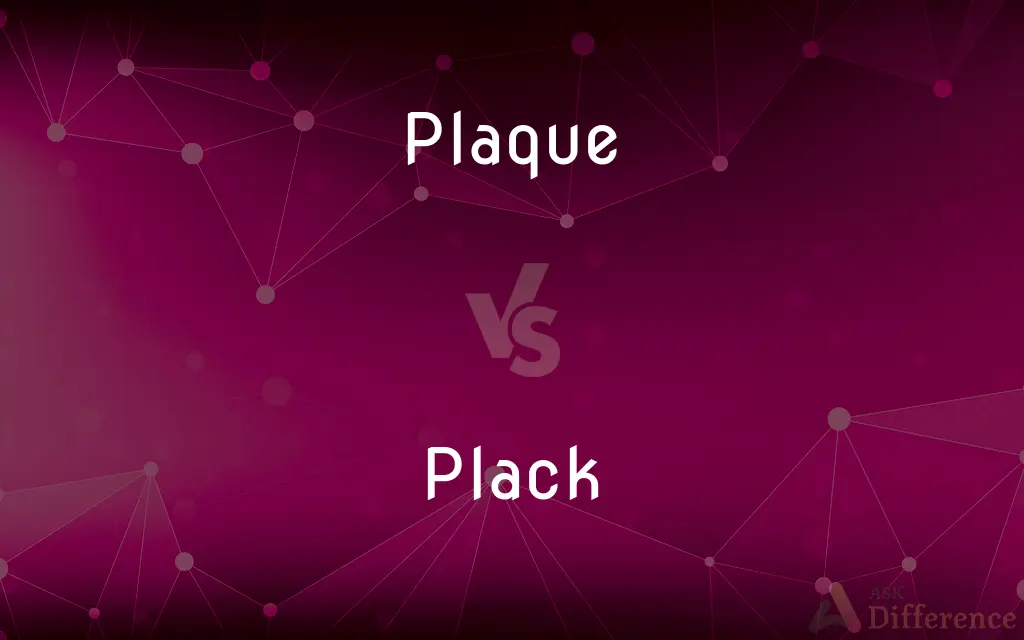Plaque vs. Plack — What's the Difference?
By Tayyaba Rehman — Updated on October 30, 2023
Plaque is a deposit on teeth or a commemorative tablet. Plack is not a recognized English word, possibly a misspelling of "plaque" or a Scots coin.

Difference Between Plaque and Plack
Table of Contents
ADVERTISEMENT
Key Differences
Plaque is a term with a few different meanings. It can refer to a sticky deposit on teeth that can lead to cavities and gum disease if not properly cleaned. Plaque is also a word used to describe a commemorative tablet, usually made of metal, ceramic, or wood, which is often inscribed and affixed to a surface in memory of a person or event.
On the other hand, Plack is not commonly recognized in the English language as a word with a defined meaning. It could potentially be a typographical error for "plaque." However, within historical contexts, particularly in Scots, a "plack" was a small coin used in Scotland in the 16th and 17th centuries. It does not carry a contemporary meaning beyond this and is not used in modern language except in historical references.
When considering the term plaque, we're discussing either dental health or a commemorative item. For dental health, it's the film of bacteria that forms on the teeth and gum line. In terms of commemoration, a plaque is an object affixed to a surface in honor of a person or event. These are tangible, physical entities with concrete definitions.
Plack, in contrast, lacks a definition in the current English lexicon and may be seen as a misspelling or misinterpretation of "plaque." In historical Scottish context, a plack has a specific meaning as a coin, but this usage is largely obsolete and does not translate to any modern or common use beyond the discussion of historical currency.
Comparison Chart
Definition
A deposit on teeth or commemorative tablet.
An old Scottish coin.
ADVERTISEMENT
Use in Language
Common in dental and historical contexts.
Obsolete, not used in modern language.
Nature
Biological substance or memorial object.
Currency in historical Scotland.
Spelling
Correct spelling for the described terms.
Could be a misspelling of "plaque".
Modern Relevance
Frequently used in dental care and memorials.
Lacks relevance outside historical study.
Compare with Definitions
Plaque
An inscribed plate fixed on a monument.
The bronze plaque bore the names of the war heroes.
Plack
A small Scottish coin from the 16th and 17th centuries.
He paid a plack for a loaf of bread.
Plaque
A film of bacteria on teeth.
Regular brushing helps remove plaque from your teeth.
Plack
A term used in historical documents and transactions.
The rent for the land was ten placks per annum.
Plaque
A clear zone in a cell culture caused by viral lysis.
The virologist noted the formation of a plaque in the cell culture.
Plack
A coin made primarily of base metal.
The old plack was found tarnished but still discernible.
Plaque
An ornamental or decorative plate.
A wooden plaque hung at the entrance, welcoming guests.
Plack
The lowest value coin in pre-1707 Scotland.
A plack was not worth much, but it was still useful currency.
Plaque
A sticky deposit on teeth in which bacteria proliferate
Plaque around gum margins can lead to gingivitis
Plack
An item of interest to numismatists.
The rare plack was the highlight of the coin collection.
Plaque
A flat plate, slab, or disk that is ornamented or engraved for mounting, as on a wall for decoration or on a monument for information.
Plack
(obsolete) A coin used in the Netherlands in the 15th and 16th centuries.
Plaque
A small pin or brooch worn as an ornament or a badge of membership.
Plack
Scottish and English regional (northern). A small billon coin issued by James III of Scotland; (also) a small copper coin current in Scotland in the 15th and 16th centuries worth four Scots pennies. Now historical.
Plaque
A scaly patch on a body part, especially the skin.
Plack
A coin issued by James III of Scotland; also a 15th-16th century Scottish coin worth four Scots pennies.
Plaque
A deposit of fatty material on the inner lining of an arterial wall, characteristic of atherosclerosis.
Plack
A small copper coin formerly current in Scotland, worth less than a cent.
With not a plack in the pocket of the poet.
Plaque
The material that such a deposit is composed of.
Plaque
A clear, often round patch of lysed cells in an otherwise opaque layer of a bacteria or cell culture.
Plaque
(countable) Any flat, thin piece of clay, ivory, metal, etc., used for ornament, or for painting pictures upon, as a dish, plate, slab, etc., hung upon a wall; also, a smaller decoration worn by a person, such as a brooch.
Plaque
(countable) A small card representing an amount of money, used for betting in casinos; a sort of gaming chip.
Plaque
An abnormal accumulation of material in or on an organ of the body, often associated with disease.
Amyloid plaque
Apleural plaque
Asenile plaque
Plaque
An accumulation in artery walls made up of macrophage cells and debris containing lipids, (cholesterol and fatty acids), calcium, and connective tissue; an atheroma.
Plaque
An accumulation of biofilm, or bacteria, on teeth, which may develop into dental calculus (tartar).
Plaque
Any flat, thin piece of metal, clay, ivory, or the like, used for ornament, or for painting pictures upon, as a slab, plate, dish, or the like, hung upon a wall; also, a smaller decoration worn on the person, as a brooch.
Plaque
(pathology) a small abnormal patch on or inside the body
Plaque
An accumulation of fatty substances.
The autopsy revealed plaque in the patient's arteries.
Plaque
An ornamental tablet, typically of metal, porcelain, or wood, that is fixed to a wall or other surface in commemoration of a person or event.
Plaque
A small, distinct, typically raised patch or region on or within the body resulting from local damage or deposition of material, such as a fatty deposit on an artery wall in atherosclerosis or a site of localized damage of brain tissue in Alzheimer's disease.
Plaque
A flat counter used in gambling.
Plaque
A biofilm of bacteria in a matrix of polysaccharides and other substances on the surface of a tooth or teeth.
Plaque
A deposit consisting mainly of beta-amyloid and degenerating nerve tissue, found in the brain tissue of people with Alzheimer's disease.
Plaque
A sharply defined zone of demyelination in the central nervous system characteristic of multiple sclerosis.
Plaque
(countable) A piece of flat metal with writing on it, attached to a building, monument, or other structure to remind people of a person or an event.
Plaque
A clearing in a bacterial lawn caused by a virus.
Plaque
In the Hornbostel–Sachs classification system: any flat, thin musical instrument.
Blown plaques
Aconcussion plaques
Plaque
A broad patch of abnormal tissue distinguishable from surrounding tissue, especially a broad irritated]] patch on the skin.
Plaque
A deposit of beta-amyloid protein occurring in a nerve cell and associated with Alzheimer's disease.
Plaque
A memorial made of brass
Common Curiosities
What is dental plaque?
Dental plaque is a sticky film of bacteria that forms on teeth.
How is plaque related to heart disease?
Arterial plaque can lead to heart disease by obstructing blood flow.
Are plaques used for awards?
Yes, plaques are often used as awards or honors.
Can a plaque be used for decoration?
Yes, a plaque can be an ornamental or commemorative item.
What does a commemorative plaque represent?
It typically honors a person, event, or achievement.
Is plack still used in any language?
No, plack is obsolete and not used in modern language.
Is there any modern use for the term plack?
No, plack is not used in contemporary language outside historical reference.
Is plaque harmful?
Dental plaque can lead to tooth decay and gum disease if not removed.
Can plaque be cleaned from historical monuments?
Yes, with careful restoration and cleaning techniques.
What was a plack in Scotland?
A plack was a small coin used in Scotland during the 16th and 17th centuries.
Could plack be a misspelling?
Yes, it could be a misspelling of "plaque."
Do plaques have any medical significance?
Yes, besides dental, plaques in arteries are significant in medical diagnoses.
Are placks valuable to collectors?
Yes, historical coins like placks can be valuable to numismatists.
How do you prevent dental plaque?
Through regular brushing, flossing, and dental check-ups.
Does plaque refer only to negative contexts?
No, plaque can also have a positive connotation when referring to commemorative items.
Share Your Discovery

Previous Comparison
Aeroplane vs. Airplane
Next Comparison
Handicap vs. HandicappedAuthor Spotlight
Written by
Tayyaba RehmanTayyaba Rehman is a distinguished writer, currently serving as a primary contributor to askdifference.com. As a researcher in semantics and etymology, Tayyaba's passion for the complexity of languages and their distinctions has found a perfect home on the platform. Tayyaba delves into the intricacies of language, distinguishing between commonly confused words and phrases, thereby providing clarity for readers worldwide.












































